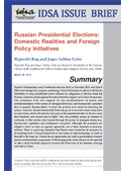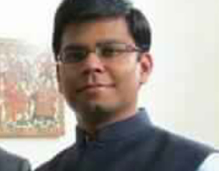Russian Presidential Elections: Domestic Realities and Foreign Policy Initiatives
 Russia’s Parliamentary and Presidential elections held in December 2011 and March 2012 were besieged by a popular awakening. Putin’s declaration of a tie up with Dmitri Medvedev to swap presidential power followed by allegations of election fraud led Russian citizens to protest against the notion that their support can be taken for granted. The protestors were also angered by the personalisation of power and institutionalisation of the system of managed democracy and bureaucratic capitalism that is uniquely Russian-styled. In short, the protests were aimed at reforming the system. However, the fact remains that Putin may go on to serve two more consecutive six year terms, which will take his total years in the presidential office to 20; two more than Brezhnev and second only to Stalin. This will probably ensure an element of continuity in the system when looked through the prism of managed democracy, bureaucratic capitalism, and widespread corruption. Although the protestors are alleged to have no clear cut agenda, apparently one of their demands is economic reforms. There is a growing realisation that Russia must modernise its economy by diversifying from a resource-based one to one based on high technology in order to flourish in the long run. Therein lies an opportunity for India to participate in Russia’s massive modernisation programme. On the foreign policy front, Russia can be expected to take a more hard-line approach towards the West even as its interests converge with that of China.
Russia’s Parliamentary and Presidential elections held in December 2011 and March 2012 were besieged by a popular awakening. Putin’s declaration of a tie up with Dmitri Medvedev to swap presidential power followed by allegations of election fraud led Russian citizens to protest against the notion that their support can be taken for granted. The protestors were also angered by the personalisation of power and institutionalisation of the system of managed democracy and bureaucratic capitalism that is uniquely Russian-styled. In short, the protests were aimed at reforming the system. However, the fact remains that Putin may go on to serve two more consecutive six year terms, which will take his total years in the presidential office to 20; two more than Brezhnev and second only to Stalin. This will probably ensure an element of continuity in the system when looked through the prism of managed democracy, bureaucratic capitalism, and widespread corruption. Although the protestors are alleged to have no clear cut agenda, apparently one of their demands is economic reforms. There is a growing realisation that Russia must modernise its economy by diversifying from a resource-based one to one based on high technology in order to flourish in the long run. Therein lies an opportunity for India to participate in Russia’s massive modernisation programme. On the foreign policy front, Russia can be expected to take a more hard-line approach towards the West even as its interests converge with that of China.





